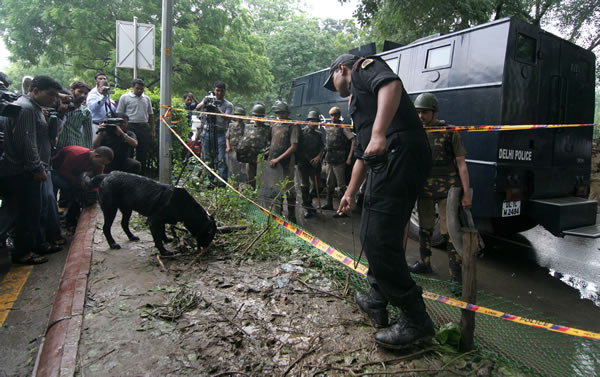Terrorists struck again in India—this time in the nation’s capital at the High Court, where at least 11 were killed and more than 80 were injured. Today’s attack comes less than two months after serial bombings in Mumbai claimed 25 lives. While suspicions for the Mumbai attacks fell on a shadowy homegrown terrorist group called the Indian Mujahideen, today’s bombing was claimed by a well-known, Pakistan-based terrorist group that has also been active in Bangladesh.
The Harakat-ul-Jihadi-Islami (HuJI)—a group that focused on attacking targets in Indian Kashmir in the 1990s and has more recently forged ties to al-Qaeda—claimed responsibility for the bombing in an email to the Indian National Investigative Agency. The group demanded repeal of a death sentence for an alleged terrorist on death row for involvement in a 2001 attack on the Indian parliament. That attack precipitated a six-month military standoff between India and Pakistan that U.S. officials feared could erupt into nuclear conflict.
Following the July 13 attacks in Mumbai, India demonstrated its determination to move forward with peace talks with Pakistan by sticking to a scheduled meeting between the two countries’ foreign ministers two weeks later.
Despite HuJI’s past connections to Pakistani intelligence, Indian leaders may again avoid pointing fingers of blame across the border, especially given that Pakistan also experienced a major terrorist attack today in the city of Quetta in Baluchistan province. In what was likely retaliation for Pakistan’s capture on Monday of al-Qaeda operative Younis al-Mauretani, terrorists conducted suicide bombings against a senior Pakistani military commander and his family that claimed more than 20 lives.
The nearly simultaneous terrorist attacks in India and Pakistan demonstrate that despite recent U.S. successes against al-Qaeda’s core leadership in Pakistan, the terrorist scourge will continue to threaten peace and stability in South Asia. Al-Qaeda’s affiliate organizations, like HuJI, the Lashkar-e-Tayyiba (LeT; responsible for the 2008 Mumbai attacks), and the Tehrik-e-Taliban Pakistan (TTP) remain motivated and capable.
While the LeT and HuJI seek to portray a sense of chaos and instability in India, they will fail in their aims. India has shown its resilience in the face of attacks and its determination to improve its counterterrorism capabilities. Indian Prime Minister Manmohan Singh reacted strongly to the attack at the High Court, declaring, “We will never succumb to the pressure of terrorism…this is a long war in which all political parties, all the people of India have to stand united so that the scourge of terrorism is crushed.”
The dual attacks in India and Pakistan also drive home the need for both countries to work together to prevent terrorists from dictating events in the region and striking at will in either country. Pakistani officials have long tolerated terrorist groups that are linked to al-Qaeda, facilitating the organization’s ability to use Pakistan as a launch pad for international terrorist campaigns and jeopardizing the stability of the Pakistani state. Pakistani officials are slowly realizing the costs of their segmented approach toward terrorism.
As the Heritage Foundation Counterterrorism Task Force argued in its August 24 report, America must maintain persistent engagement in South Asia to cope with the “next wave” of transnational terrorism. This means an ever-increasing level of counterterrorism cooperation between the U.S. and India on what are essentially common security threats. And it means exerting the pressure necessary to convince Pakistan that al-Qaeda affiliates like the LeT and the Harakat-ul-Mujahideen, whose leader was in contact with Osama bin Laden’s courier before the May 2 raid, must be stopped.
Source material can be found at this site.










